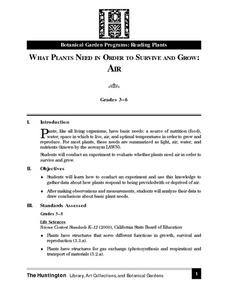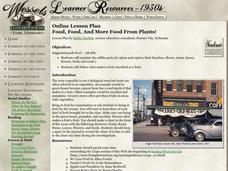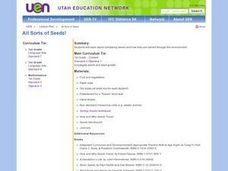Curated OER
Blowing and Flowing
Fifth graders compare and evaluate the rate of erosion from water and wind on three type of landscape: bare land, land with sparse vegetation, and land covered by dense vegetation.
Curated OER
Erosion by the Wind
Fifth graders simulate wind driven soil erosion by using paper confetti to demonstrate the movement of the soil. They write about three examples of soil erosion found in their community.
Curated OER
Plant Parts We Eat
I bet the kids in your class will love to eat their vegetables after an engaging lesson plan about edible plants. They read information about vegetables and edible plants, sort vocabulary words, identify plant parts, measure and graph...
Curated OER
Drawing Plants with Plant Studio Freeware
Students identify parts of plants by name and the relationship among these parts as they use Plant Studio Freeware Wizard and tools on the computer to draw a particular plant from life or from a picture.
Curated OER
Garden Grid
Basically, your class reads about different garden plants from an included handout and seed packets that you provide, and then uses a grid to plan out where to place the plants. They can practice counting with the seeds, grouping,...
Curated OER
What Plants Need in Order to Survive and Grow: Air
Students conduct an experiment to determine whether plants need air in order to survive and grow. They discuss natural resources, analyze slides, and observe and record data from the experiment.
Curated OER
What Plants Need in Order to Survive and Grow: Light
Students conduct an experiment to evaluate whether plants need light to survive and grow. They observe and gather data about plant responses to different growth regimes, analyze the data, and make conclusions about basic plant needs.
Curated OER
What Plants Need in Order to Survive and Grow: Soil
Students conduct an experiment to evaluate whether plants need soil to survive and grow. They plant two seeds, one with soil and one without, make predictions, and record and analyze the seed germination results on a worksheet.
Curated OER
Food, Food, And More Food From Plants!
Learners examine the edible parts of a plant and explore their function. They define what makes a fruit classified as a fruit. They create a sketch or map or photo of a 1930s farm and justify their plant selections.
Curated OER
1st Grade - Act. 17: Observing Plants Through a Journal
First graders observe plants and write and illustrate what they have learned in their discovery journal.
Curated OER
It's All About the Roots
Students investigate the process of hydroponic agriculture. They grow beans in different hydroponic solutions, compare results and graph their observations.
Curated OER
Do Plants Need Sunlight?
Students investigate why plants need sunlight and what happens if they do not get the light they need.
Curated OER
What a Garden Can Teach Us
Third graders read "Seedfolks" and "What a Garden Can Teach Us" and discuss how a garden is like a community. They create a class quilt illustrating how their classroom community the lines of the poem.
Curated OER
Discovering Plants With Lewis and Clark
Students research plants and examine populations in ecosystems.
Curated OER
Sowing Seeds: the Beginning of the Fast Plant Life Cycle
Students plant seeds, observe and tend plants. They identify major plant parts, how to germinate and troubleshoot problems with plants; and, that plants need water, light, and soil nutrients to thrive. They create a Plant Growth Data Log.
Curated OER
Co-evolution of Plants and Pollinators
Young scholars explore biological evolution and natural selection and its evolutionary consequences. They also explore how organisms are interdependent on one another.
Curated OER
Poetry In the World Around Us
Students engage in a lesson plan which is designed as a literacy connection to science lessons on the effects of water on plants. This lesson plan uses an excellent Reading Rainbow episode on the effect of drought, and then rainfall,...
Curated OER
How Does Your Garden Grow?
Students read The Garden by Arnold Lobel, plant seeds to discover what makes them grow, and record their observations in their journals.
Curated OER
Growing plants
Students explore plants and recognize that they are living things that require light and water to grow; students identify, name and match the parts of plants.
Curated OER
PLANT LIFE CYCLES
Student learns about the life cycle of plants by watching a time-lapse video. This activity provides students with further evidence that all living things grow and change as they progress through their life cycle. Student conducts a...
Curated OER
Plants And Pollination
Students describe sexual reproduction in plants, including the process of pollination, how insects assist in pollination, and how pollination differs from fertilization. They also explore the importance of honey bees to Arizona agriculture.
Curated OER
All Sorts of Seeds!
First graders compare seeds and explore how they are carried through the environment.
Curated OER
Sprouting Scientists!
First graders observe and describe plants as they grow from seeds.
Curated OER
Plants and Animals: Partners in Pollination
Students describe the complementary relationships between pollinators and the plants they pollinate, identify adaptations that flowers have developed to "encourage" pollination, and create and draw their own "designer" flowers.

























